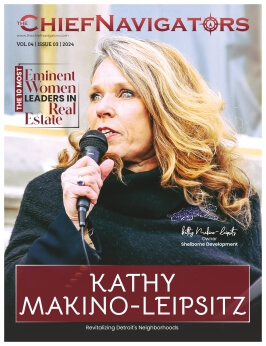Kathy Makino-Leipsitz: Revitalizing Detroit's Neighborhoods
The 10 Most Eminent Women Leaders in Real Estate

Kathy Makino-Leipsitz, the owner of Shelborne Development, is dedicated to revitalizing blighted neighborhoods in Detroit through the historic rehabilitation of long-vacant buildings. Her journey began with the advent of the 1986 tax reform act and the establishment of the Low-Income Housing Tax Credit (LIHTC), which she saw as a powerful tool for creating affordable housing.
In 1995, Kathy constructed her first LIHTC development in Westland, utilizing a vacant school site to bring forth 60 units of newly constructed, affordable apartments. This project breathed new life into a distressed census tract that had suffered from decades of neglect and disinvestment.
Motivated by this initial success, Kathy established Shelborne Development in 2000 with a focus on rejuvenating neighborhoods in Detroit. Her approach involves acquiring vacant and blighted historic apartment buildings and undertaking meticulous historic rehabilitations. Over the past 15 years, her efforts have been concentrated in the Palmer Park, New Center, and East Jefferson Corridor neighborhoods.
Kathy’s passion for real estate was ignited early on, as she purchased her first rental property at the age of 19 while still attending college at the University of Michigan-Dearborn. Her academic background in Economics, complemented by a minor in Psychology, provided her with a solid foundation for her endeavors in property development.
From Adversity to Empowerment
Kathy’s upbringing as the youngest of five children took a significant turn when her father became permanently disabled when she was just 12 years old. Despite the financial challenges that followed, Kathy displayed remarkable resilience and determination from a young age. She began working at the age of 12 to help her family survive on a modest disability check, engaging in various entrepreneurial endeavors to make ends meet.
Despite the hardships, Kathy maintained a sense of gratitude for the love and support of her family, who instilled in her a belief that she could achieve anything she set her mind to. Her experiences observing a successful businessman in her neighborhood inspired her to save money diligently. By the age of 19, she had saved enough for a down payment on a duplex in a disadvantaged neighborhood called Norwayne.
Living amidst poverty and witnessing the struggles of families in Norwayne deeply impacted Kathy’s perspective on socioeconomic inequality. This realization motivated her to make a difference in the lives of children born into difficult circumstances. At the age of 25, she opened a daycare center with the aim of empowering young children to believe in their potential and pursue their dreams, regardless of their background.
Kathy’s journey from adversity to empowerment highlights her resilience, compassion, and commitment to making a positive impact on the lives of others, particularly children facing similar challenges she once did.
The Story of Norris Apartments
Kathy’s journey came full circle when she had the opportunity to develop a site where a vacant, blighted school once stood in the heart of Norwayne, the neighborhood where she grew up. Having attended school there and purchased her first rental property in the area, this opportunity held special significance for her. In 1995, she was awarded Low-Income Housing Tax Credits (LIHTC) by MSHDA to build Norris Apartments, an affordable community.
Norris Apartments quickly became one of the most desirable places to live in Westland, maintaining a waiting list since its inception. Kathy’s vision for the development was clear: to create a space where residents, especially children, would not feel disadvantaged due to their socioeconomic status. She aimed to provide them with a home that mirrored market-rate developments, complete with cathedral ceilings, granite counters, ceramic tile, stainless steel appliances, and beautiful architectural design and landscaping.
For Kathy, providing affordable housing goes beyond just offering a place to live. It’s about giving families the emotional lift they need to feel good about their surroundings, take pride in their homes, and believe in their own capabilities. She recognizes the power of perception and aims to challenge stereotypes associated with poverty by offering residents a home that reflects dignity, quality, and opportunity.
Regulatory Challenges in Historic Rehabilitation
Kathy recounts a challenging experience with the National Park Service during the historic rehabilitation of buildings in the Palmer Park Apartment District. Despite successfully completing seven other historic rehabilitations in Michigan, the National Park Service unexpectedly denied approval for five out of eight buildings, resulting in significant financial losses totaling over $5 million in tax credits.
The decision seemed arbitrary and politically motivated, coinciding with a change in administration in Washington, DC. Despite following approved demolition plans and maintaining the historic integrity of the exterior and common areas, the denial was based on a minor interior alteration to accommodate full-size appliances.
This setback highlights the risks and uncertainties developers face when undertaking historic rehabilitation projects for affordable housing. Such decisions can not only jeopardize individual projects but also impact developers financially and discourage future investments in historic preservation.
The unfortunate outcome forces developers to reconsider their choices, potentially opting for new construction over adaptive reuse of historic buildings. This, in turn, could hinder the revitalization of distressed communities, as vacant buildings continue to deteriorate, perpetuating blight and impeding progress.
Kathy stresses the need for greater consideration and transparency in decision-making processes related to historic preservation. Unforeseen denials by regulatory agencies like the National Park Service can discourage developers from pursuing vital projects, ultimately stalling the revitalization efforts of communities in need.
Call for Inclusive Affordable Housing Solutions
Kathy highlights the pressing challenges in the field of affordable housing development, recognizing that many social issues, including healthcare costs, criminal justice reform, food deserts, child wellbeing, income inequality, racial inequality, and senior poverty, are interconnected and cannot be adequately addressed without access to quality affordable housing.
To tackle these challenges, Kathy emphasizes the need for increased access to gap financing to support the development of affordable housing projects. While the 9% tax credit is a valuable tool for those at or below 60% of the Area Median Income (AMI), she calls for policies that address the housing needs of individuals and families with incomes between 60% and 140% of the AMI.
By expanding access to affordable housing across income brackets, innovative solutions can help ensure that residents spend less than 30% of their income on housing, promoting financial stability and improving overall quality of life. Kathy believes that committing to addressing the affordable housing crisis at both the local and national levels is essential for addressing the root causes of various social challenges and fostering inclusive communities.
Awards Celebrate Community Revitalization
Kathy is proud of the awards that Shelborne Development has received over the years, recognizing the positive community impact of their projects. Through the rehabilitation of long-vacant and blighted apartment buildings, as well as the creation of commercial and retail spaces, their projects have revitalized neighborhoods, making them more vibrant, walkable, and pedestrian-friendly.
These awards serve as a testament to the transformative power of historic rehabilitation. By breathing new life into neglected properties and repurposing them for modern use, Shelborne Development has played a crucial role in restoring communities and fostering economic growth. Kathy sees these accolades as validation of their commitment to creating sustainable and thriving neighborhoods that benefit both residents and businesses alike.
Vision for Affordable Housing
Kathy is deeply passionate about contributing to the ongoing revitalization of Detroit’s neighborhoods. However, she envisions her future aspirations extending beyond local efforts. Kathy aims to advocate for and help shape national policies that streamline the process of developing quality affordable housing. She believes that it shouldn’t be as challenging as it currently is to address such a crucial societal need. By working towards national policy reform, Kathy hopes to make significant strides in expanding access to affordable housing and fostering sustainable communities on a broader scale.
Please visit: www.shelbornedevelopment.com



